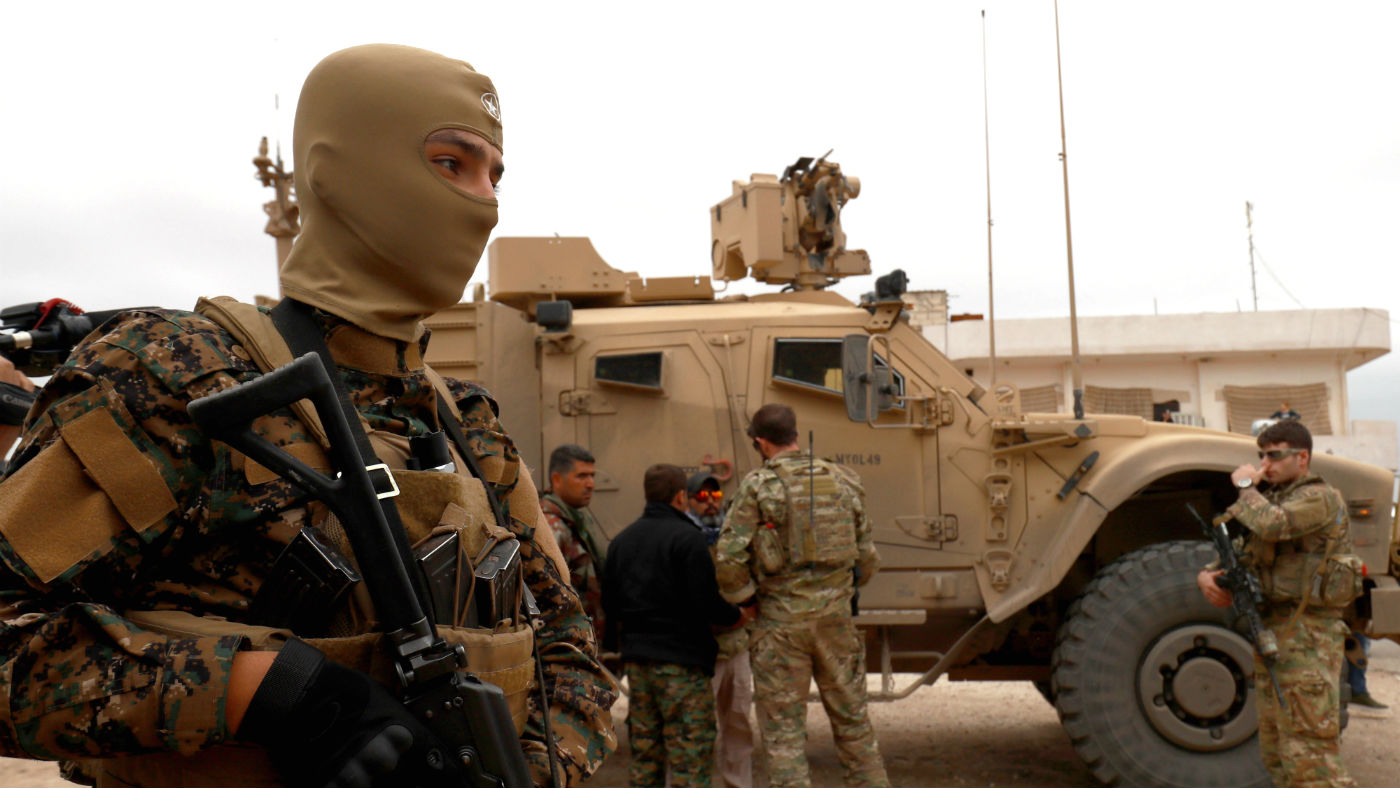Is the US withdrawal from Syria premature?
Donald Trump says Islamic State has been defeated, but defence officials want to maintain a US military presence in the region

A free daily email with the biggest news stories of the day – and the best features from TheWeek.com
You are now subscribed
Your newsletter sign-up was successful
To the surprise of his allies and the frustration of senior officials Donald Trump has decided to pull out all US troops from Syria, claiming Islamic State had been “defeated” and their job is done.
There are currently around 2,000 US troops on the ground in the war-torn country where they are primarily training local forces to combat Islamic State (IS). They have helped rid much of north-eastern Syria of the terrorist group, but pockets of fighters remain.
Nevertheless, “a complete, rapid withdrawal, if confirmed, would upend assumptions about a longer-term US military presence in Syria” reports Al Jazeera.
The Week
Escape your echo chamber. Get the facts behind the news, plus analysis from multiple perspectives.

Sign up for The Week's Free Newsletters
From our morning news briefing to a weekly Good News Newsletter, get the best of The Week delivered directly to your inbox.
From our morning news briefing to a weekly Good News Newsletter, get the best of The Week delivered directly to your inbox.
US Defence Secretary Jim Mattis and other senior US officials have advocated maintaining a US presence in the country.
Just a few days ago, Brett McGurk, Trump's special presidential envoy for the global coalition to defeat IS, said: “Nobody is saying that [IS fighters] are going to disappear. Nobody is that naive. So we want to stay on the ground and make sure that stability can be maintained in these areas.”
French President Emmanuel Macron had made it a national priority to persuade the US president to keep troops in Syria as a bulwark against an IS resurgence, and thought he had won the argument.
But it appears the temperamental US president has gone over the heads of his generals and made the decision to begin a “full” and “rapid” withdrawal from Syria, “taking allies and his own advisers by surprise”, says The Guardian.
A free daily email with the biggest news stories of the day – and the best features from TheWeek.com
It fulfils a long-standing desire to get out of Syria, but it could have significant ramifications for Washington’s Kurdish allies and for the region as a whole.
The New York Times says “Pentagon officials who had sought to talk the president out of the decision as late as Wednesday morning argued that such a move would betray Kurdish allies who have fought alongside American troops in Syria and who could find themselves under attack in a military offensive now threatened by Turkey”.
Turkey has said it was preparing to launch an operation against a US-backed Kurdish militia in northern Syria, something that risks confrontation with the US.
“Even though the US will continue to maintain troops in Iraq with the capability of launching strikes into Syria, a US withdrawal of ground forces would fulfill a major goal of Syria, Iran and Russia and risks diminishing US influence in the region,” say CNN’s Barbara Starr and Ryan Browne.
Trump’s own national security adviser, John Bolton, is adamantly opposed to withdrawing troops. At the UN general assembly in September he declared: “We’re not going to leave as long as Iranian troops are outside Iranian borders and that includes Iranian proxies and militias.”
“IS is well on the way to being defeated. Syria's President Assad remains in place. If the goal now is to contain Iran or Russia's rising influence in the region then 2,000 troops strung out across a vast swathe of territory may be too small a force to do this,” says BBC diplomatic correspondent Jonathan Marcus.
“Their presence though does give the US 'skin in the game'. And many will see this decision as yet another indication of the chaos and uncertainty surrounding US policy towards this crucial region,” he writes.
-
 Local elections 2026: where are they and who is expected to win?
Local elections 2026: where are they and who is expected to win?The Explainer Labour is braced for heavy losses and U-turn on postponing some council elections hasn’t helped the party’s prospects
-
 6 of the world’s most accessible destinations
6 of the world’s most accessible destinationsThe Week Recommends Experience all of Berlin, Singapore and Sydney
-
 How the FCC’s ‘equal time’ rule works
How the FCC’s ‘equal time’ rule worksIn the Spotlight The law is at the heart of the Colbert-CBS conflict
-
 Munich Security Conference: a showdown between Europe and Trump?
Munich Security Conference: a showdown between Europe and Trump?Today’s Big Question Report suggests European leaders believe they can no longer rely on the US for military support – but decoupling is easier said than done
-
 New START: the final US-Russia nuclear treaty about to expire
New START: the final US-Russia nuclear treaty about to expireThe Explainer The last agreement between Washington and Moscow expires within weeks
-
 Would Europe defend Greenland from US aggression?
Would Europe defend Greenland from US aggression?Today’s Big Question ‘Mildness’ of EU pushback against Trump provocation ‘illustrates the bind Europe finds itself in’
-
 Greenland, Colombia, Cuba: where is Donald Trump eyeing up next?
Greenland, Colombia, Cuba: where is Donald Trump eyeing up next?Today's Big Question Ousting Venezuela’s leader could embolden the US administration to exert its dominance elsewhere
-
 Did Trump just end the US-Europe alliance?
Did Trump just end the US-Europe alliance?Today's Big Question New US national security policy drops ‘grenade’ on Europe and should serve as ‘the mother of all wake-up calls’
-
 Trump peace deal: an offer Zelenskyy can’t refuse?
Trump peace deal: an offer Zelenskyy can’t refuse?Today’s Big Question ‘Unpalatable’ US plan may strengthen embattled Ukrainian president at home
-
 Vladimir Putin’s ‘nuclear tsunami’ missile
Vladimir Putin’s ‘nuclear tsunami’ missileThe Explainer Russian president has boasted that there is no way to intercept the new weapon
-
 Russia’s war games and the threat to Nato
Russia’s war games and the threat to NatoIn depth Incursion into Poland and Zapad 2025 exercises seen as a test for Europe